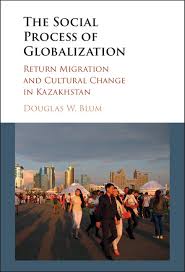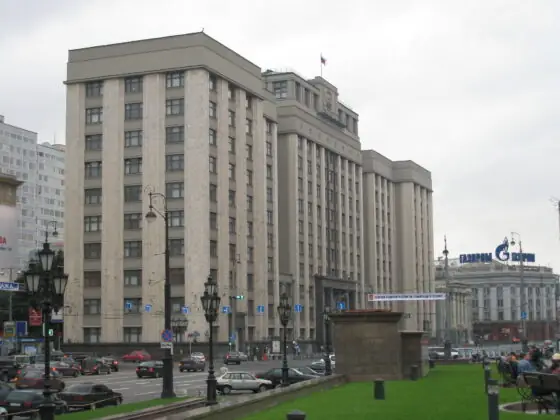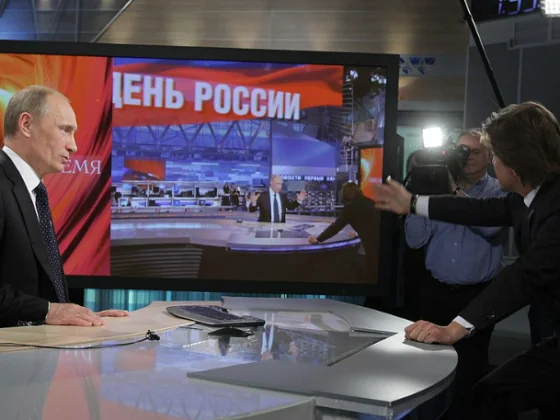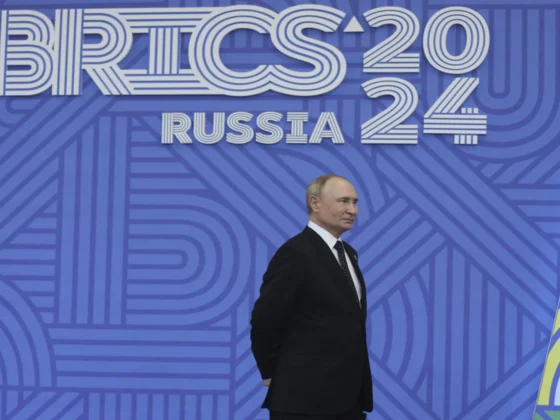(PONARS Eurasia Policy Memo) Many observers of Russian political life have noted a shift in President Vladimir Putin’s language toward greater “ethnonationalism.” While this trend has been present for a few years, it became especially prominent after the start of the Ukraine conflict. In his March 2014 speech justifying the annexation of Crimea, Putin stated that Crimea was a russkii (Russian) land, Sevastopol a russkii city, and Kiev “the mother of russkie cities.” Conventionally, russkii is interpreted as defining Russians linguistically and ethnically, while the adjective rossiiskii is used to refer to the Russian state and citizenship. A number of scholars have built on this observation to argue that Putin has shifted from statist to ethnic nationalist and that Russia’s growing ethnicization endangers Russia’s traditional multinational character.
This, however, is too narrow a view. The use of the term russkii does not imply a growing ethnicization of Russian state identity. It may be the case that Russian society is developing a more acute sense of ethnic awareness (even if ethnic nationalism, as demonstrated by levels of xenophobia, ethnic tension, and ethnic crime, has been in decline since the beginning of the Ukraine conflict). Yet, the term russkii does not encapsulate this evolution. Here I propose some alternative connotations to better capture the complexity of Russia’s current political project: russkii as a way to reinforce the historical unity of Eastern Slavs (Russians, Ukrainians, and Belarusians)—and therefore hamper Ukraine from leaving Russia’s nest—and russkii as a way to assert Russia’s messianic destiny.
A History of Terminological Competition
Terms have their own history, and meanings evolve in time and space. Chronicles date the Christianization of Russia in Kiev to the baptism of Prince Vladimir in the tenth century. This state was referred to as Kievskaia Rus’. The term Rus’ and its derivative adjective russkii were used for centuries to refer to the state, culture, and language that was born from this principality. The competing term of Ros was used by Byzantines since the ninth century. It was present in Russia in the fifteenth century as Rosia, and in the eighteenth century as Rossiia. In the early nineteenth century, the two roots were used in parallel. Confusion was the norm; depending on the context, the subjects of the Russian state could be rossiiskii, russkii, or obshcherusskii; ethnic Russians could be rossiiskie, russkie, velikorossiiskie, or velikorusskie.
What is interesting is that after the term russkii fell into partial disuse because of the rise of its rossiiskii competitor, it was revived in the second half of the nineteenth century in a specific geopolitical context. As French scholar Virginie Symaniec demonstrates, the revival of the use of russkii had distinct political objectives, i.e., the “reunification of Russian lands” after the period of Polish-Lithuanian domination. The root Russ sought to define what might also be called “Eastern Slavic,” a generic term that includes the three modern nations of Russia, Ukraine, and Belarus. This aim is visible in the terminological dissociation between the “Russification” (rusifikatsiia) of non-native populations of the empire (e.g., Siberian, Turkic, and Caucasian peoples), and the “re-Russification” (obrusenie) of the russkie who had been Polish-Lithuanian for several centuries.
Russkii: A Bridge to Ukraine, Not a Claim of Russia’s Mono-ethnicity
I did not take this historical detour to claim that Vladimir Putin, who is more passionate about martial arts than historical works, is aware of the multiple convolutions of the terms russkii and rossiiskii, or that he uses them with consciousness of their history. What this detour shows is that russkii has two meanings. Today it defines all those who do not consider themselves to belong to a national minority group in Russia and identify as “ethnic” Russians, but it also designates the unity of Eastern Slavs, which is the much older meaning of the term.
I argue that Putin’s use of the term in his 2014 speeches concerns this second meaning: the revival of the imperial meaning of russkii, in order to reconnect Eastern Slavs. Ukraine is part of this russkii realm based on the legacy of the Kievan Rus’, which was lost to Poland and Lithuania for several centuries, then reintegrated into Russia, and is now in the process of being lost again.
This explains why Putin can both insist increasingly on russkii while continuing to claim the principle of Russia’s multinational character. Contrary to what many observers thought they noticed, his definition of russkii is not the opposite of rossiiskii. On this, Putin differs from many Russian nationalist circles that want to promote russkii as a response to what they see as the failure of rossiiskii. Their fear of Russia losing its own identity predominantly targets migrants from Central Asia and Russia’s North Caucasians (Russia’s Siberian peoples, Tatars, Bashkirs, and Finno-Ugric populations are not perceived as a threat). However, Putin is not an ethnonationalist and does not use russkii in the same ideological way that ethnonationalists do.
Insisting on Kiev, Crimea, and Sevastopol as russkii does not underline an ethnic nationalism that would discriminate against non-ethnic Russian citizens of Russia. Rather it is the continuation of an old historical theme, which stipulates that Eastern Slavs in their three modern national units come from the same cradle, Kievan Rus’. Historically speaking, Kiev is indeed a russkii land, whereby russkii is understood in the original sense of Eastern Slavs, not the modern Russian state. The notion of the “reunification of Russian lands” (sobranie russkikh zemlei) is thus not evidence of ethnic irredentism but a ghost from the imperial past. Putin’s message is directly aimed at reviving this imperial longue durée in the hope that Ukraine will not leave Russia’s sphere of influence and become “absorbed” into the European world.
Russian Messianism: Russkii as Russia’s Voice in the World
The “imperial” use of the term russkii is also connected to another meaning, which again should not be understood as ethnocentric. Russkii is the classic adjective used to describe all messianic ideological trends that developed in Russia, especially during the Silver Age (the vivid philosophical revival of the 1890s-1920s). In the works of Vladimir Soloviev and Nikolai Berdyaev, Russia’s unique and distinct message to the world is formulated as a russkii, not rossiiskii, one, even though neither of them can be considered an ethnonationalist. Nikolai Fedorov’s variety of space theology, cosmism (kosmizm), is also termed russkii. These are all rooted in Fyodor Dostoyevsky’s conception of a fraternal unity of mankind where Russia serves as a pioneer, expressed under the notion of “Russian universality” (russkoe vsemirnoe).
This traditional Russian messianism has been updated and absorbed under the more modern label of the “Russian World” (russkii mir). Long before it became part of the Russian state narrative, the term was crafted by a team of intellectuals close to Gleb Pavlovsky’s Russian Institute (russkii institut) and its journal, Russkii zhurnal, which inspired many subsequent online media projects and served as incubator for a large number of young publicists, thinkers, and journalists. The designers of the Russian World concept were all passionate about Russian philosophy and, at the same time, were specialists in marketing and branding. This merging of genres proved to be a potent mix. In the marketing sense, the Russian World is a brand for establishing Russia’s voice in the chorus of nations, but it is also a vessel for a more philosophical or religious messianism, whereby Russia’s message to the world has a universal value of salvation.
Pavlovsky’s Institute, its journal, and the Russian World concept all use the term russkii, not rossiiskii. But these individuals too are far from being ethnonationalists who seek an ethnically pure, minority-free Russia. In their definition russkii is not understood to have an ethnocentric character. The problem, for them, is that the term rossiiskii is overly reminiscent of the Yeltsin political project and its limits. A rossiiskaia Russia embodies a failed liberal ideology and leaves the diffuse impression of cloning Russia the way the West wanted it to be. In contrast, the Russian Institute’s russkaia Russia is a call both to participate in the globalized world and to offer a particular Russian voice.
Conclusion
Some of the key notions of Russian stateness are complex and require careful consideration of historical context and terminological use. The term russkii is a multifaceted one. It can sometimes advance an ethnonationalist agenda, but it is not Kremlin authorities that use it in that sense. For them, russkii is a reminder of the shared past of all those who descend from Kievan Rus’. Seen from the Kremlin’s perspective, this shared past should determine a shared future: Putin regularly states that “Russians and Ukrainians are one people.” The term russkii therefore encapsulates not a drift toward ethnonationalism but difficulties in letting the imperial past go, in particular by accepting that Ukraine’s “russkii-ness” might not be embodied in a pro-Russia geopolitical position. The term also promotes Russia’s messianic destiny: previously Christian or Communist, today the flagship of conservative values and the “Russian World.” This revival of the imperial meaning of russkii may be used in parallel with rossiiskii to define the state’s multinational character. The semantic uses of russkii and rossiiskii are not mutually exclusive but overlap and diverge depending on the context in which they are used.
Marlene Laruelle is Research Professor of International Affairs, Associate Director of the Institute for European, Russian and Eurasian Studies (IERES), and Director of the Central Asia Program at the George Washington University.
[PDF]









